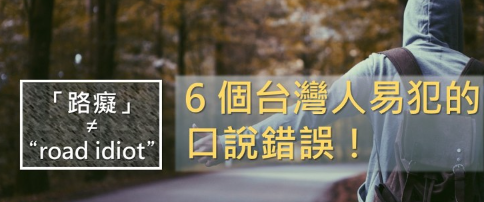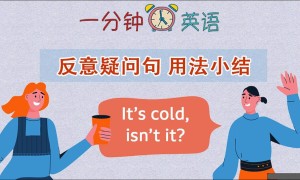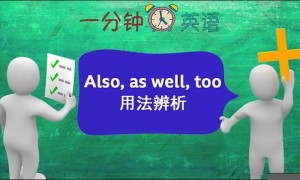1.「住旅馆」≠ “live in a hotel”
(一位台湾人在国外旅游,在跟一位外国人聊天)
外:“So do you live around here?”
外:「所以你家在这附近吗?」
台:“No, I live in a hotel.”
台:「不,我家住在旅馆。」
外:“Well…I don’t think that’s possible…”
外:「这个嘛…我想这不太可能…」
“live in a hotel” 其实是指真的长久住在旅馆,把旅馆当成家的意思,想必正常人应该都不会闲闲没事住在旅馆吧,除非是旅馆老板!正确说法应为 “stay at a hotel”,表示自己只是短期待在旅馆,时间到就会回家了!介系词也要注意用 “at”,而不是 “in” 喔!
live in a hotel (X)
stay in a hotel (X)
stay at a hotel (O)

2.「我带你去」≠ “I can bring you there.”
(一位台湾人在超商打工,遇到外国人前来询问商品摆放位置)
外:“Excuse me, can you tell me where chicken nuggets are?”
外:「不好意思,可以告诉我鸡块摆在哪里吗?」
台:“It’s at the corner. I can bring you there.”
台:「就在角落那边。我可以把你带过去。」
外:“You want to bring me there? How?”
外:「你想把我带过去?怎么带?」
“bring” 指的是将某物品带在身上,然后拿到说话者面前。因此 “bring” 比较不会用在人身上,毕竟我们不可能把一个人带在身上。正确用法应为 “I can take you there.”,表示「我可以带你去」。或者也可以单纯讲 “Please follow me.”,意思是「请跟我来」,效果是一样滴!
I can bring you there. (X)
I can take you there. (O)
Please follow me. (O)
延伸阅读:Bring 和 Take、Further 和 Farther 你会分吗?常见易混淆单字整理!
3.「安可」≠ “uncle”
(一位外国男歌手来台表演,演唱会结束之际)
外:“It’s been a great night, fellows! Hope you’ve enjoyed the show! ”
外:「各位,这真是个美好的夜晚!希望你们喜欢这场表演!」
台:“Uncle! Uncle! Uncle! Uncle!”
台:「叔叔!叔叔!叔叔!叔叔!」
外:“Wow, I don’t even know I have that many niece and nephew!”
外:「哇!我根本不知道我有那么多姪子和姪女!」
这大概是台湾人最常犯的通病了!演唱会结束时大家喊的「安可」,其实英文不叫做 “uncle”,而是 “encore”,代表请表演者加码表演的意思。因此,千万别再叫台上的人叔叔或舅舅,而是要大喊 “encore”!
Uncle! Uncle! Uncle! Uncle! (X)
Encore! Encore! Encore! Encore! (O)
4.「你可以打我的手机」≠ “You can call my cellphone.”
(一位台湾女生遇见一个外国男生,两人互有好感)
台:“I really enjoy spending time with you.”
台:「我很享受跟你相处的时光。」
外:“Yeah, we have a lot in common.”
外:「对啊,我们有很多共同点。」
台:“Well, you can call my cellphone if you want to hang out with me!”
台:「嗯,如果你想要跟我出去,可以打电话给我的手机!」
外:“Actually, I’m not into your cellphone. I’m into you.”
外:「其实,我喜欢的不是妳的手机,而是妳。」
这个错误没有那么严重,许多外国人口语上也会讲 “call my cell”,但 “You can call my cellphone.” 和 “call my cell” 的意思其实是你可以打电话给我的「手机」,而不是打给手机的「主人」。正确的讲法应为 “You can call me on my cellphone.”,意思是「你可以透过我的手机打给我」。
You can call my cellphone. (X)
call my cell. (X)
You can call me on my cellphone. (O)
5.「特价」≠ “for sale”
(一位外国人到柜台结帐,店员发现某个商品买第二件有打折)
台:“If you buy two of these, you’ll get a discount. It’s for sale!”
台:「如果你买两个就有打折喔。这个商品待售中!」
外:“Hmm…I think you meant “on sale”?”
外:「呃…我想你的意思是,这件商品特价中?」
“for sale” 是指某商品「待售中」,而正确用法应为 “on sale”,表示此商品「特价中」。
延伸阅读:【生活用语】在国外购物却看不懂特价的英文? VT让你学越多省越多!
6.「路痴」≠ “road idiot”
(一位台湾游客到国外旅游,不小心迷了路,向一位外国人求助)
台:“Excuse me, do you know where the Central Station is? I’m a road idiot.”
台:「不好意思,你知道中央车站在哪里吗?我是个路上的白痴。」
外:“It’s just right up ahead. By the way, you don’t really have to call yourself an idiot.”
外:「直直向前走就到了。不过,你真的没有必要称自己是白痴啦!」
路痴的英文绝对不是 “road idiot”!如果要用英文形容自己没有方向感,可以说 “I have no sense of direction.” 即可!
I’m a road idiot. (X)
I have no sense of direction. (O)







